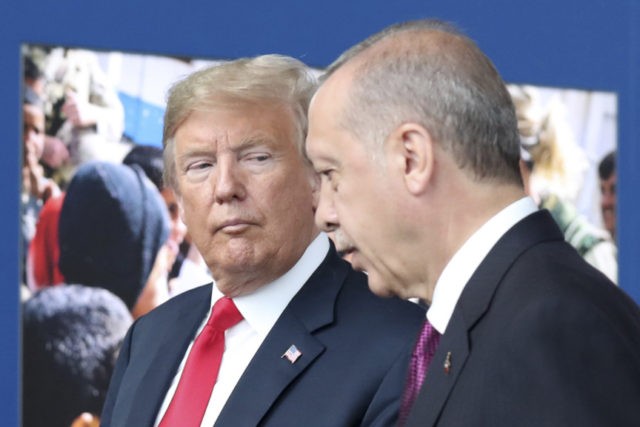President Donald Trump threatened on Sunday to “devastate Turkey economically” if Turkish forces attack the Kurds in Syria after the United States withdraws.
The office of Turkish President Recep Tayyip Erdogan responded on Monday by telling Trump it would be a “fatal mistake” to treat a Turkish attack on the Kurdish YPG militia, which Turkey considers a terrorist organization, as an assault on the Kurdish people.
Trump delivered his warning to Turkey in a pair of tweets discussing his Syria policy on Sunday. Trump encouraged both Turkey and the Syrian Kurdish militia to back away from a confrontation:
A spokesman for Turkish President Recep Tayyip Erdogan responded on Monday by warning Trump, “It is a fatal mistake to equate Syrian Kurds with the PKK, which is on the U.S. terrorist list, and its Syria branch PYD/YPG.”
“Turkey fights against terrorists, not Kurds. We will protect Kurds and other Syrians against all terrorist threats,” spokesman Ibrahim Kalin promised.
“Terrorists can’t be your partners and allies,” Kalin told Trump. “Turkey expects the U.S. to honor our strategic partnership and doesn’t want it to be shadowed by terrorist propaganda.”
Erdogan’s communications director Fahrettin Altun added that Turkey will “continue its anti-terror fight decisively.”
“Terror is terror and it must be eradicated at its source. This is exactly what Turkey is doing in Syria,” Altun said.
The PKK, or Kurdistan Workers Party, is a violent Kurdish separatist organization in Turkey that the U.S. State Department indeed lists as a foreign terrorist organization. The PYD (Democratic Union Party) is the largest Syrian Kurdish political party, while the YPG (People’s Protection Units) is effectively its armed wing. The YPG militia was one of the most effective battlefield allies of the United States in the war against the Islamic State.
Turkey insists the PYD and YPG are actively allied with the PKK and are essentially branches of the same Kurdish separatist organization. Turkey’s looming strategic nightmare involves Kurds in Iraq, Syria, and Turkey joining together to declare an independent state that would absorb territory from all three nations. Turkey complains that weapons given by Western allies to the YPG to fight ISIS are finding their way across the border into PKK hands.
The United States disputes this characterization and wants Turkey to halt its military incursion into Syria against Kurdish forces, an assault Turkey named “Operation Olive Branch” because it believes peace can only be established by pushing Syrian Kurdish forces away from the Turkish border. President Trump strives to assuage fears that U.S. military withdrawal from Syria will give Turkey a green light to massacre the Kurds.
Turkish Foreign Minister Mevlut Cavusoglu complained on Monday that President Trump should not issue public demands while the U.S. is negotiating with Turkey to reach an understanding about Syria.
“Strategic partners do not talk via Twitter and social media,” Cavusoglu said.
The foreign minister said Turkey has proposed a “buffer zone” along the Turkey-Syria border that seems compatible with Trump’s demand for a safe zone around the Kurds, presuming the Kurds agree to fall back outside the buffer zone. He criticized the administration of Trump’s predecessor, former President Barack Obama, for refusing to consider this proposal due to “various excuses” and said the Trump administration is only entertaining it now due to “Turkey’s determination.”
The New York Times noted Trump’s tweet was the first time he has publicly threatened Turkey, a fellow member of NATO. The Times worried Trump’s aggressive comments could “upend Secretary of State Mike Pompeo’s attempt to reach a deal with Turkey to protect them.”
Pompeo did not appear perturbed by Trump’s tweets when he spoke with reporters in Riyadh, Saudi Arabia, on Monday.
“You’ll have to ask the president,” he said when asked what Trump meant by economic devastation for Turkey. “We have applied economic sanctions in many places, I assume he is speaking about those kinds of things. You’ll have to ask him.”
Pompeo endorsed Trump’s demand for a safe zone around the Syrian Kurds. “If we can get the space and the security arrangements right it would be a good thing for everyone in the region,” he said.
Just as Turkish and U.S. policies are at odds concerning the connection between Syrian Kurds and the Turkish PKK separatists, so the current proposals clash over the difference between Turkey’s desire to establish a “buffer zone” around its border and the U.S. plan for a “safe zone” around the Kurds.
Despite Turkey’s talk of peace and olive branches, it has repeatedly made clear it intends to attack the Kurds if they do not withdraw from the envisioned “buffer zone,” which is considerably larger than what U.S. planners and the Kurds are comfortable with. Turkey’s determination to push east of the Euphrates River is especially worrisome.
Washington and other concerned foreign powers do not place a great deal of faith in Turkey’s assurances that it can fight Kurdish “terrorist” militias without harming civilians or engaging in battle with Kurdish units directly supported by the West during the fight against ISIS.
Cavusoglu stated on Sunday that Turkey is offended by Trump administration officials, such as National Security Adviser John Bolton, and foreign governments, such as Israel, telling the Turks they cannot push as far into Syria as they deem necessary for their own security interests.
“We do not seek permission from anyone. We would take necessary steps against terrorists near our borders, and we will decide the timing on our own,” Cavusoglu said.

COMMENTS
Please let us know if you're having issues with commenting.